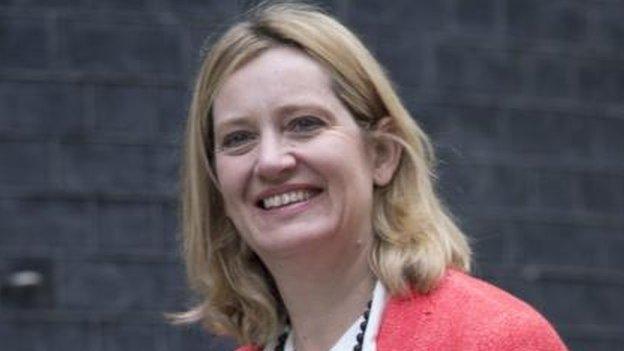Big six energy firms face price call from Energy Secretary Amber Rudd
- Published

Amber Rudd took on the job of Energy Secretary after the election
The major energy suppliers in the UK are facing pressure from the new government over their prices.
Energy Secretary Amber Rudd has spoken and written to the "big six" suppliers to question them about whether prices are reflecting companies' costs.
One consumer group said the firms had "run out of excuses" for failing to cut prices further.
But the energy companies have said they are operating in a highly competitive market.
'Regain trust'
"In light of the greater regulatory stability we are providing and continued stability in wholesale gas prices, I believe that energy suppliers should be seeking to regain the trust of consumers by reflecting this in their pricing decisions," Ms Rudd said in a letter seen by the BBC.
The latest analysis by regulator Ofgem estimated that firms could increase their profit margins to up to £118 per customer on an estimated annual dual-fuel deal this year.
It added that wholesale gas and electricity costs were £80 lower than their estimated level a year ago.
The possibility of a price freeze, proposed by the Labour Party, has also been extinguished by the General Election result.
Last month, energy company SSE - one of the big six - reported a 40% rise in profits from its retail arm, despite losing more than 500,000 customers over a year.
A spokesperson for SSE said: "Two price cuts in 13 months and an unrivalled price freeze until July 2016 proves the importance SSE places on giving customers lower prices for longer. Providing this peace of mind for customers requires a long-term approach to pricing; however, as ever, if we can cut them again, we will."
All the big six firms - SSE, British Gas, Scottish Power, Npower, EDF, and E.On - cut gas prices earlier in the year, but campaigners say this failed to reflect continuing falls in wholesale costs.
Richard Lloyd, executive director of consumer group Which?, said: "Energy firms have totally run out of excuses for not cutting our bills.
"It is good that ministers are acting but we now need to see suppliers do the right thing, and fast. If they don't play ball it will add weight to the case for the competition authority to step in and force the energy firms to make bills fair."

Analysis by John Moylan, Industry Correspondent, BBC News
The government has pledged to be on the side of hard-working families, so it is little surprise that the new energy secretary has entered the debate about energy prices. But is her letter to the big six suppliers - seen by the BBC - really a "declaration of war" as one newspaper put it?
That's not how the firms see it.
It does raise a legitimate question - with the prospect of a Labour price freeze gone, is there now the opportunity to look again at energy tariffs?
A sudden round of price cuts looks unlikely: the industry is about to be hit with initial findings from the biggest probe into the energy sector since its privatisation.
While wholesale prices have continued to soften, the firms point out that these costs now make up less than half of our domestic bill. But Amber Rudd's move seems designed to put down a marker that energy prices will be at the top of her agenda.

Shopping around
The Competition and Markets Authority (CMA) has been investigating the energy market since last summer.
It has already reported that gas and electricity customers could have cut their bills by moving their custom to new products or different suppliers.
From 2012 to 2014, more than 95% of dual-fuel customers of the big firms would have have saved money by switching tariffs or suppliers, it said.
The savings they missed ranged from £158 to £234 a year per customer, the CMA said.
Its full findings are expected soon.
A spokesman for Energy UK, which represents the major energy firms, said: "More companies are entering the market and by shopping around customers can find deals that are both cheaper than this time last year and which match individual circumstances.
"Our members will be replying to the Secretary of State in due course and the industry as a whole is keen to work constructively with the new government to ensure energy security at a price everyone can afford."